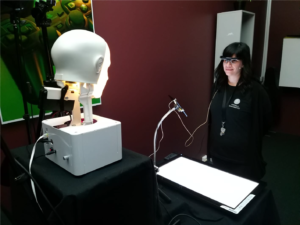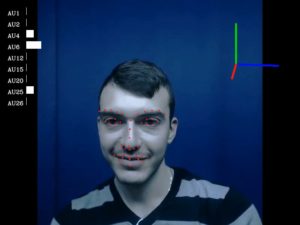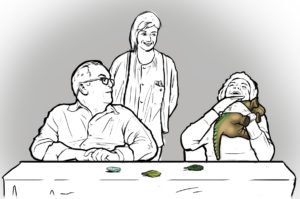Gender in Humanoid Robotics: Social categorization, Stereotyping, and Norm violations (2021 - now)
EINDHOVEN UNIVERSITY OF TECHNOLOGY (TU/e) – research partly funded by the ESDIT programme (the Ethics of Socially Disruptive Technologies), an NWO Gravitation Grant.

Within this project, Dr. Perugia is studying how people attribute gender to humanoid robots; which roles, contexts, behaviors, and physical features guide the process of gender attribution. She is particularly interested in understanding if and how the way roboticists imbue humanoid robots with gender cues and laypeople attribute gender to them is influenced by stereotypes and biases existing in society at large, and how a robot’s genderedness might affect people’s perceptions of a robot. Within this topic, she has collaborated or is currently collaborating with researchers from University of Naples Federico II (Prof. Silvia Rossi and Dr. Alessandra Rossi), University of Siena (Dr. Stefano Guidi and Prof. Oronzo Parlangeli), Sant’Anna School of Advanced Studies (Piercosma Bisconti Lucidi), Linköping University (Dominika Lisy), Uppsala University (Dr. Katie Winkle), Bielefeld University (Prof. Friederike Eyssel), Potsdam University (Dr. Maike Paetzel-Prüsmann), TU Wien (Dr. Katta Spiel), Utrecht University (Dr. Maartje de Graaf), Tokyo Institute of Technology (Dr. Katie Seaborn) and more.
Long-term Development of First Impressions (2018-2021)
UPPSALA UNIVERSITY – research carried out as part of the COIN Project – “Co-adaptive human-robot interactive systems” – funded by the Swedish Foundation for Strategic Research (SSF) and Maike Paetzel Prüsmann’s doctoral project.
 Dr. Perugia, Dr. Paetzel-Prüsmann and colleagues carried out a number of studies aimed at understanding how the perception of robots develops over time, from first impressions to repeated exposures up to repeated interactions (with multiple days of zero exposure in between) with the robot. They discovered that different perceptual dimensions stabilize within different time frames, with the robot’s competence being the fastest to stabilize and perceived threat the most fluctuating over time. Furthermore, they also found out that people’s mutual gaze in a social chat with a robots develops congruently with their perceptions of the robot over time.
Dr. Perugia, Dr. Paetzel-Prüsmann and colleagues carried out a number of studies aimed at understanding how the perception of robots develops over time, from first impressions to repeated exposures up to repeated interactions (with multiple days of zero exposure in between) with the robot. They discovered that different perceptual dimensions stabilize within different time frames, with the robot’s competence being the fastest to stabilize and perceived threat the most fluctuating over time. Furthermore, they also found out that people’s mutual gaze in a social chat with a robots develops congruently with their perceptions of the robot over time.
Facial Mimicry of Virtual, Human, and Robotic Agents (2018 - 2021)
UPPSALA UNIVERSITY – research carried out as in collaboration with the Institute of Intelligent Systems and Robotics (Paris).
 For this project, Dr. Perugia and colleagues studied whether and how people mimic the facial expressions of the six basic emotions displayed by artificial agents differing in embodiment and humanlikeness. Facial mimicry is the spontaneous unconscious imitation of a facial expression observed in another individual and is usually a good proxy of likability and rapport. In this study, Dr. Perugia and colleagues discovered that people do mimic the facial expressions of artificial agents. However, they also disclosed that, in a task-oriented context devoid of a social meaning, the relation between facial mimicry and likability flips, and robots that are liked more are actually mimicked less.
For this project, Dr. Perugia and colleagues studied whether and how people mimic the facial expressions of the six basic emotions displayed by artificial agents differing in embodiment and humanlikeness. Facial mimicry is the spontaneous unconscious imitation of a facial expression observed in another individual and is usually a good proxy of likability and rapport. In this study, Dr. Perugia and colleagues discovered that people do mimic the facial expressions of artificial agents. However, they also disclosed that, in a task-oriented context devoid of a social meaning, the relation between facial mimicry and likability flips, and robots that are liked more are actually mimicked less.
ENGAGE-DEM: A Model of Engagement of People with Dementia (2014-2018)
POLYTECHNIC UNIVERSITY OF CATALONIA (UPC) and EINDHOVEN UNIVERSITY OF TECHNOLOGY (TU/e) – research carried out within the Erasmus Mundus Joint Doctorate (EMJD) in Interactive and Cognitive Environments (ICE) funded by the European Education and Culture Executive Agency (EACEA).
 Within her doctoral project, Dr. Perugia developed a model of engagement for people with dementia based on non-verbal behavior and psychophysiology. This model, the ENGAGE-DEM, can be used to measure the engagement of people with dementia during leisure activities, assess the progression of engagement over time, and act as scaffold for the automatic recognition of engagement in this user group. The achievement of such a milestone could bring to the design of robotic and interactive technologies able to recognize the engagement state of the person with dementia online and adapt accordingly.
Within her doctoral project, Dr. Perugia developed a model of engagement for people with dementia based on non-verbal behavior and psychophysiology. This model, the ENGAGE-DEM, can be used to measure the engagement of people with dementia during leisure activities, assess the progression of engagement over time, and act as scaffold for the automatic recognition of engagement in this user group. The achievement of such a milestone could bring to the design of robotic and interactive technologies able to recognize the engagement state of the person with dementia online and adapt accordingly.
,
Social Robots Supporting Narratives in People with Dementia (2012 - 2013)
UNIVERSITY OF SIENA – research carried with the Robotics and Learning Technologies Lab.
For her Master’s thesis, Dr. Perugia designed and performed a study aimed at evaluating whether a social robot, the arctic seal PARO, could have a positive influence on the narrative capability of people with dementia. The study followed a repeated measures design. Participants were paired and asked to create stories together in two conditions, with the help of pictures and with PARO. The sessions with the social robot showed an increase in positive affect and social interaction. Moreover, the stories created with the robot were twice as long as those created with the pictures, and more autobiographical.